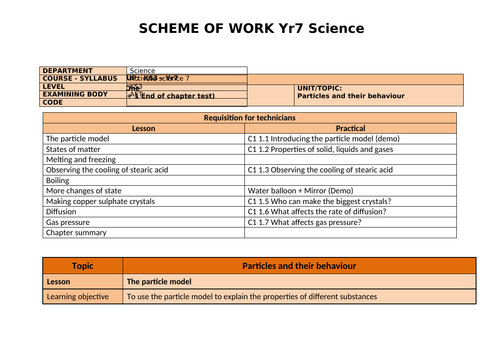243Uploads
113k+Views
55k+Downloads
Chemistry

C2.4 Group 7 Halogens
AQA GCSE Sciences (9-1)
Chemistry: C2 The periodic table
Lesson 4: C2.4 Group 7 Halogens
Based on the Kerboodle Resources
The AQA Kerboodle worksheet are not included so as to be acting within the TES code of conduct.
Keywords: Displacement reaction, Halogens, Halides

C2.6 The transition elements
AQA GCSE Sciences (9-1)
Chemistry: C2 The periodic table
Lesson 6: C2.6 The transition elements
Based on the Kerboodle Resources
The AQA Kerboodle worksheet are not included so as to be acting within the TES code of conduct.
Keywords: Transition elements

C2.5 Explaining trends
AQA GCSE Sciences (9-1)
Chemistry: C2 The periodic table
Lesson 5: C2.5 Explaining trends
Based on the Kerboodle Resources
The AQA Kerboodle worksheet are not included so as to be acting within the TES code of conduct.

C2.1 Development of the periodic table
AQA GCSE Sciences (9-1)
Chemistry: C2 The periodic table
Lesson 1: C2.1 Development of the periodic table
Based on the Kerboodle Resources
The AQA Kerboodle worksheet are not included so as to be acting within the TES code of conduct.

Yr7 Particles. Scheme of Work for Kerboodle Activate 1 (SoW)
Content
Lesson objective
Skills objective
Learning outcomes
Keywords
Numeracy
Practical
Homework
Misconceptions
Key questions to ask
Lesson plans:
The particle model (Practical)
States of matter (Practical)
Melting and freezing
Observing the cooling of stearic acid (Practical)
Boiling
More changes of state (Practical)
Making copper sulphate crystals (Practical)
Diffusion (Practical)
Gas pressure (Practical)
Chapter summary

Atomic Theory
In this lesson, learners will learn about the billiard ball model, plum pudding model, nuclear model and Bohr model of the atom.
They will also learn the contribution of James Chadwick and how to distinguish the different sub-atomic particles.

J J Thomson & Plum Pudding Model
Learners will discover how JJ Thomson came up with his Plum Pudding Model and will also see how Millikan discovered the charge of the electron.

Rutherford & The Nuclear Model
In this lesson, learners discover how Rutherford and his students deduced the nuclear model from the alpha scattering experiement.








